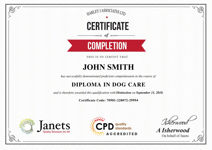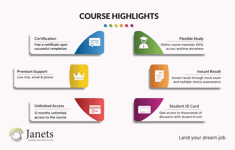Mushroom Nutrition and Culinary Applications
CPD Certified Diploma | FREE Exam | 24/7 Tutor Support | Lifetime Access | 100% Success Rate
Janets
Summary
- Certificate of completion - £9.99
- Certificate of completion - £15.99
- Exam(s) / assessment(s) is included in price
- Tutor is available to students
Add to basket or enquire
Overview
The Mushroom Nutrition and Culinary Applications course is an in-depth course that covers the principles and techniques of growing mushrooms. With the rising demand for nutritious and eco-friendly food, growing mushrooms has become a profitable and sustainable business. This Mushroom Nutrition and Culinary Applications course will equip learners with the knowledge and skills necessary to cultivate mushrooms both commercially and for personal use. By learning about the ideal growing conditions, harvesting and storing techniques, and running a mushroom business, learners can turn their passion for mushrooms into a successful career.
Learning Outcomes:
This Mushroom Nutrition and Culinary Applications course will help you to learn following things:
- Identify edible mushrooms and describe their characteristics.
- Understand the process of mushroom cultivation from culture to harvesting.
- Demonstrate knowledge of different mushroom-growing conditions.
- Understand how to make mushroom compost and casing beds.
- Learn the techniques for growing mushrooms indoors and outdoors.
- Understand the business aspects of mushroom cultivation.
- Explain the harvesting and storing of mushrooms.
- Demonstrate the ability to grow mushrooms independently.
CPD
Course media
Description
The Mushroom Nutrition and Culinary Applications course is designed to equip learners with a thorough understanding of the principles and techniques of mushroom cultivation. The Mushroom Nutrition and Culinary Applications course covers a range of topics from identifying edible mushrooms to the ideal growing conditions, harvesting and storing techniques, and running a mushroom business. Additionally, learners will gain an in-depth understanding of the nutritional and culinary benefits of mushrooms.
Here is the curriculum breakdown of this Mushroom Nutrition and Culinary Applications Course:
Module 01: Introduction to Mushroom Cultivation
This module provides an introduction to the history of mushroom cultivation and the various types of mushrooms available in the market.
Module 02: Identifying Edible Mushrooms
In this module, you'll learn how to identify and distinguish between edible and poisonous mushrooms, their characteristics, and their importance in culinary uses.
Module 03: Mushroom Culture Part One
This module covers the basics of mushroom culture, including how to create spawn and the different types of substrates required for mushroom cultivation.
Module 04: Mushroom Culture Part Two
In this module, you'll learn about different strains of mushrooms and the methods used to grow them.
Module 05: Mushroom Spawning
This module teaches you how to use spawn to grow mushrooms and the various factors that affect mushroom growth.
Module 06: Mushroom Compost Part One
You'll learn how to create and prepare mushroom compost in this module, including the various components required for making high-quality compost.
Module 07: Mushroom Compost Part Two
This module covers the different types of mushroom compost, including their properties and uses.
Module 08: Making and Casing Mushroom Beds
In this module, you'll learn how to create and prepare mushroom beds, including the casing layer and the appropriate thickness of the substrate.
Module 09: Mushrooms Growing Conditions
This module provides an overview of the different environmental conditions required for mushroom growth, including temperature, humidity, and lighting.
Module 10: Growing Mushrooms Outside
In this module, you'll learn how to grow mushrooms outdoors, including the different factors that affect mushroom growth.
Module 11: Harvesting and Storing Mushrooms
This module covers the proper techniques for harvesting and storing mushrooms to ensure their freshness and quality.
Module 12: Mushroom Business
In this module, you'll learn about the business aspects of mushroom cultivation, including marketing, sales, and the economics of the mushroom industry.
Who is this course for?
The Mushroom Nutrition and Culinary Applications course is ideal for anyone interested in developing a comprehensive understanding of mushroom cultivation, including individuals interested in commercial mushroom production, aspiring entrepreneurs, and culinary enthusiasts looking to incorporate mushrooms into their cooking.
Career path
- Mushroom Cultivator - £20-30k/year
- Mushroom Farm Manager - £25-40k/year
- Mushroom Business Owner - £30-60k/year
- Mushroom Quality Control Technician - £18-25k/year
- Mushroom Sales Representative - £20-35k/year
Questions and answers
Currently there are no Q&As for this course. Be the first to ask a question.
Certificates
Certificate of completion
Digital certificate - £9.99
Receive a digital copy of your certificate as a PDF file for only £9.99.
Certificate of completion
Hard copy certificate - £15.99
A Physical, high-quality copy of your certificate will be printed and mailed to you for only £15.99.
For students within the United Kingdom, there will be no additional charge for postage and packaging. For students outside the United Kingdom, there will be an additional £10 fee for international shipping.
Reviews
Currently there are no reviews for this course. Be the first to leave a review.
Legal information
This course is advertised on reed.co.uk by the Course Provider, whose terms and conditions apply. Purchases are made directly from the Course Provider, and as such, content and materials are supplied by the Course Provider directly. Reed is acting as agent and not reseller in relation to this course. Reed's only responsibility is to facilitate your payment for the course. It is your responsibility to review and agree to the Course Provider's terms and conditions and satisfy yourself as to the suitability of the course you intend to purchase. Reed will not have any responsibility for the content of the course and/or associated materials.




